A Forum to Remember …
On December 9, Achieve Hartford’s “Transformative Education Governance Forum” brought together dozens of education stakeholders – public officials, students, teachers, principals, business leaders, community organizers, funders and social workers – to discuss the role of government in ensuring every school is of high quality and every child gets a high-quality education. Sponsored by the Nellie Mae Education Foundation, the forum focused on just how governance could be restructured to help the Hartford Public Schools transform into a high-performing, student-centered system for all. Here’s what came out of it.
At the forum, attendees came to join together in an honest and shared assessment of what is working (and, in many respects, not working) with our current approach to school board governance.
We heard:
A provocative call to action from Achieve Hartford!’s executive director Paul Diego Holzer (at the 23:30 time stamp), outlined the urgency to reexamine our governance structure here in Hartford so as to better promote student success for all.
An insightful roundtable discussion with Board of Education Chair Richard Wareing and Vice-Chair Tiffany Glanville (at the 37:47 time stamp), offered an overview of the various obstacles currently facing the Board of Education and the limitations faced when addressing current HPS student, educator, and community needs.
Skype presentation from Amy Anderson of ReSchool Colorado, (at the 2:22 time stamp) unveils a learner-based (as opposed to school-based) model that includes providing each individual student with a “Navigator”/advocate to guide and track the student to and through a wide range of learning sites both in the class room and beyond.
The forum also took in an in-person presentation from Matt Matera of Empower Schools, showcasing a highly collaborative approach at the 33:59 time stamp of this video, examining shared responsibility and governance among many key education stakeholders.
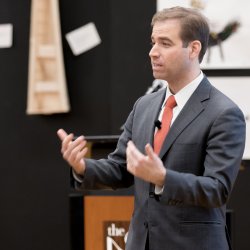
Mayor Luke Bronin
(Following an introduction by Achieve Hartford’s Paul Holzer) Wide-ranging Q&A remarks from Mayor Luke Bronin (at the 1:22:15 time stamp), including a forward-thinking vision on the need for collective leadership and responsibility in the greater Hartford region.
A very moving student-led panel from Journalism and Media Academy seniors, sharing the profound impact that student-centered learning has on the lives of Hartford students – coupled with a direct call to action for the leaders in the room to do more to support student success. Please see the :40 time stamp.
Powerful comments from Acting HPS Superintendent Dr. Leslie Torres-Rodriguez and others, including addressing the need to transform HPS’s culture into an “emboldened culture of continuous learning”. Please see the :35 time stamp and hear it out.
The Bottom Line.
Can school governance in Hartford be reconsidered on a clean slate? The jury is still out on this. But last week’s Transformative Governance Forum revealed in stark detail that the need to improve (if not outright transform) is as clear as day for students and adults alike. As State Board of Education Chair Allan Taylor put it, the attendees were engaged for the whole day – and it was not an easy one.
Just the idea of transforming Hartford school governance sends a chill up your spine – and requires you to have one! As we here at Achieve Hartford! finalize our next steps, we offer the following guiding principles for any actions to be taken regarding governance in Hartford:
- Place Students at the Center. Success for students must come by centering conversations about education (and education itself) around students AND by inviting students meaningfully into the conversation to help create what education could and should look like in the 21st century.
- Break the Mold. Alternative models from Colorado and Springfield, MA, respectively, suggested break-the-mold attempts to shake up the system of governance, through collaborations among traditional authorities, teacher unions, and programs networked across schools. Unusual alliances are welcome; even more unusual ways to center on student needs may be needed.
- Bring in New Blood. Should there be representatives from community organizations on Board of Education committees, as Board Member Tiffany Glanville suggested? “We have a lot of problems and we could use all the help we can get,” Board Chair Richard Wareing advised. There may be a real opportunity here.
- Elevate the Work Politically. This is a pivotal time for Board of Education recruitment of new members – and training for those well-intentioned souls now on the job, who want to do it right but cannot be asked to continue flying blind. And two seats remain unfilled. Neither Mayor Bronin (in the case of his delayed, fifth appointment to the Board) nor the Democratic Committee (in the case of its obligation to fill the seat left open when elected Board Member Beth Taylor moved out of the city) has yet to appoint. It’s time.
- Do More than Stick a Toe in the Water. Can student exposure be increased to the adult workplace world, as described by Journalism and Media Academy seniors who have interned at the CT Public Broadcasting Network CPBN) this year? “This is a real-life building; you have to be serious,” JMA’s Ashley Floyd said. Several other students concurred; working with deadline assignments, and just being expected to fulfill them on time without being treated as children, was a real eye opener. How can that be expanded and enhanced for all students?
Overall, our Transformative Education Governance Forum revealed that, if we truly want to prepare our students to be 21st century leaders to engage in a robust post-secondary workforce pipeline, we must all do better and must demand more from our governing bodies – including the Board of Education. But we also must be willing to do things differently to get there. Stay tuned for more discussion on transforming governance!


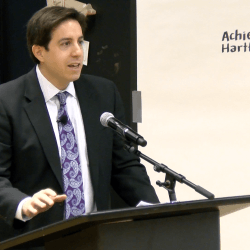
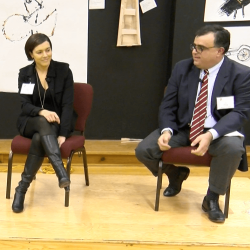
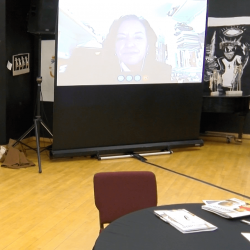
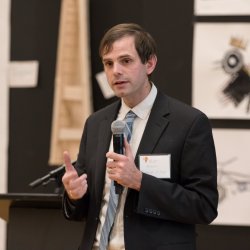
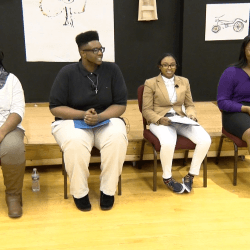
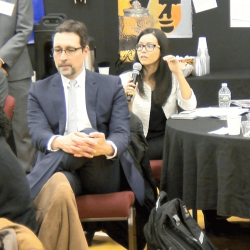
Pingback: Who’s on First and What’s on Second? – Achieve Hartford